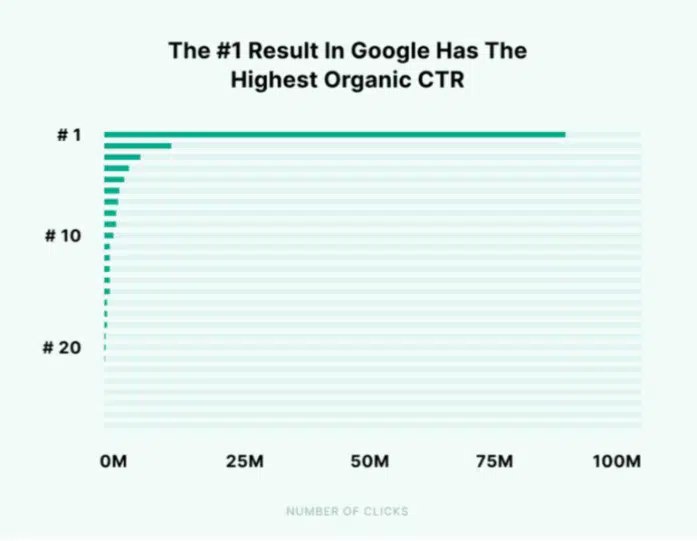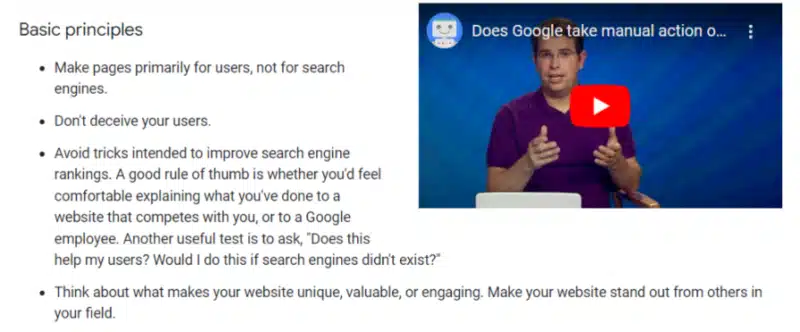How SEO and content marketing work together
With both SEO and content in your marketing strategy, the results will be much more impressive than using either alone.
SEO and content marketing go together so well. They just work.
For best results, you shouldn’t do content marketing without considering how SEO fits in.
Conversely, you shouldn’t do SEO without understanding how content provides substance and connection to what ultimately matters at the heart of it all: your audience.
With both content and SEO working together, you’ll hit two bullseyes:
- SEO drives targeted, relevant traffic from Google – not random people who won’t care about what you do or sell, but rather prospects who could join your audience and convert at some point. It’s so powerful, SEO drives 1,000% more traffic than organic social media.
- Content marketing builds trust, authority, and loyalty with those prospects. If you’ve been paying attention, most modern consumers do diligent research before making purchases, and they want to like and trust the brands they give their money. 55% of buyers rely more deeply on content for researching and making purchase decisions than they did a year ago.
To put it lightly, SEO and content marketing have an incredibly symbiotic relationship. Let’s explore how they harmonize.
First, what is content marketing?
Content marketing is the creation, publication, and distribution of online content (from blogs and videos to ebooks and podcasts).
This content is not intended to sell something or promote the brand, but rather educate, entertain, or empower prospects. This nurtures their interest, engagement, and trust over time so they eventually become customers.
What is SEO?
SEO, or search engine optimization, is the process of optimizing and improving your website (and your website content) so it’s visible in search results, where people are hunting for information, answers, products, and services.
It can’t be understated how important it is these days to show up in search engines, especially Google. Google Search, Images, and Maps drive 92.96% of global traffic. If your website and pages rank highly in the search engine, you’ll earn a good slice of that.
What are the major differences between SEO and content marketing?
SEO and content marketing are different but related.
Let’s put it this way:
- SEO is what brings targeted traffic to your site, including your content.
- SEO includes a set of actions you can carry out to optimize your website and content to show up in searches.
- Content is how you keep those people on your pages, nurture and eventually convert them into customers.
- Content can be optimized for specific keyword searches that connect to the audience (and buyer’s journey stage) you want to bring in.
To sum up, each one supports the other.
But how, exactly? In what specific ways do content marketing and SEO intertwine for the benefit of brands, search engines, and the users who need them?
How does SEO complement content marketing? (and vice versa?)
SEO and content marketing are very much a yin and yang situation. One improves the other and vice versa.
With both in your strategy, the results will be much more impressive than using either alone.
1. SEO drives relevant traffic to nurture content
You don’t write content so it gets sucked into the black hole of the internet. You write content with the hopes that some weary readers will find it and come away with giant light bulb moments.
They’ll associate those moments with your brand and your expertise. That’s formidable.
Content that doesn’t get read is useless. If you want it to contribute to the success of your marketing, you need people reading it so it can do its job nurturing leads.
One of the best ways to ensure the right eyes land on your content? Use SEO tactics to optimize it with keywords your targets are searching for.

68% of all website traffic comes from searches. That means, whenever someone in the world opens a browser, they’re starting their online session with a search most of the time. SEO helps drive the chunk of people who need you to your nurturing content.
2. SEO and content boost visibility and brand awareness
Want more people to associate your name with key industry terms? Start showing up consistently in their searches for those terms with SEO.
Even better, start showing up with amazing content that answers their questions and eases their specific pains – the ones only you can solve with what you know and what you sell (or, if you’re a marketer or SEO specialist, what your client knows and sells).
The better you do this, the higher your site and content will show up in results. Ultimately, earning a top 5 spot in organic (non-paid) results in Google promises the best chance people will not just see your listing, but also click on it.

CTR, or click-through rate, is the percentage of people visiting a webpage who click a specific link. The best CTRs on a search engine results page belong to the top 5 positions.
3. SEO and content work together to improve the user experience
SEO and content aren’t just about ranking in a search engine and driving traffic and leads.
Together, they also help you provide a better user experience to your audience across your website.
SEO is laden with rules and guidelines that govern:
- How your website should be structured and optimized.
- How you should approach building pages and content.
- How you should link to other sites and your own.
- The level of quality you should aim for.
- And more.
It also prohibits deceptive or manipulative behaviors that aim to trick users or game the ranking system.

Following the guidelines for your site and content doesn’t just ensure you’ll rank better – it also ensures your audience will have a good experience once they find you.
And that contributes to everyone’s goals:
- Search engines want users to find what they’re looking for quickly and efficiently, and they want to provide results that are relevant and helpful.
- Brands want prospects who find them on Google to eventually turn into customers – and there’s a better chance of that happening if the brand provides a good user experience: from relevant, useful content to a fast-loading site that’s well-structured.
4. High-quality SEO content helps your pages rank better
It’s no secret that high-quality content will help your blogs, articles, and even your landing pages and sales pages climb the search rankings.
Content quality is, in fact, one of the most important elements that will influence your SEO success – if not the most important.
As Search Engine Land’s What Is SEO guide puts it:
“Content should be your first priority when thinking about SEO.”
After all, the content on your website:
- Determines whether you’re relevant to a user’s search query and whether you’ll add value to their lives or waste their time.
- Influences how long they’ll stay on your site (will they read that entire blog? Browse your other content? Look at your “about” page and services/products?).
- Should provide evidence that they can trust you.
These are essential signals to send out to your prospects, and all of them begin and end with your content and its quality.
Don’t leave home without both SEO and content marketing working in tandem
Let’s not mince words here.
Content marketing set up in a strategy by itself does not have the same power as when it’s mashed together with SEO.
Content without smart SEO will get far less traffic, fewer reads, less engagement, and fewer conversions.
SEO without high-quality content equals a thin, uninspiring, useless website that attracts no one and earns nothing.
The secret sauce comes together when you blend the two.
SEO pulls in traffic and leads. SEO gets a brand seen on a different level. SEO ensures the user experience measures up to high standards and satisfies users.
Content engages leads and keeps them on your site. Content nurtures their interest, trust, and loyalty. Content keeps them coming back for more.
Don’t leave home without a healthy mixture of both in your strategy.
Contributing authors are invited to create content for Search Engine Land and are chosen for their expertise and contribution to the search community. Our contributors work under the oversight of the editorial staff and contributions are checked for quality and relevance to our readers. Search Engine Land is owned by Semrush. Contributor was not asked to make any direct or indirect mentions of Semrush. The opinions they express are their own.


